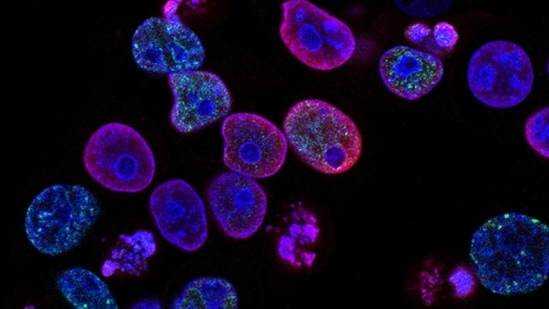Doctor breaks down the real cause of cancer in children: 4 things every parent should know
Doctor reveals warning signs most parents overlook when it comes to cancer risk in children. Here are 4 things every parent must know now.
Pediatric cancer is a heart-wrenching diagnosis that no parent ever wants to hear. While most cancers in children are not directly inherited, recent research has shed light on how genetics can play a role in the development of cancer in young patients.

Understanding the genetic factors behind pediatric cancer can help parents make informed decisions and advocate for the best possible care for their child. Read on as we will explore the role of genetics in pediatric cancer, how genetic mutations contribute to cancer development and what every parent should know.
What is pediatric cancer?
In an interview with HT Lifestyle, Dr Intezar Mehdi, Director and HOD, Senior Consultant - Paediatric Haeamtology Oncology and BMT at HCG Cancer Centre in Bengaluru, answered, “Pediatric cancer refers to cancers that occur in children and adolescents, typically under the age of 18. While cancer is more common in adults, pediatric cancers, even though rare, can be equally devastating.”

He shared, “Common types of pediatric cancer include leukemia, lymphoma, brain tumours, neuroblastoma, Wilms tumor, and bone tumors. Unlike adult cancers, which are often linked to environmental factors or lifestyle choices, pediatric cancers tend to have different causes and may sometimes involve genetic factors.”
The genetic link to pediatric cancer
Genetics plays a significant role in the development of cancer. Dr Intezar Mehdi revealed, “In children, certain genetic mutations or inherited conditions can increase the risk of developing cancer. In most cases, these cancers are not passed down directly from parent to child but rather arise from spontaneous genetic mutations. However, some children inherit genetic mutations that predispose them to certain types of cancer.”
He elaborated, “Genetic mutations are changes in the DNA sequence, which can disrupt normal cell function. These mutations may affect genes that control cell growth, repair damaged DNA, or regulate cell death. If these genes are damaged or altered, cells can begin to grow uncontrollably, leading to the development of cancer.”
The role of genetic testing
Genetic testing can play a crucial role in identifying children at higher risk for cancer. Dr Intezar Mehdi highlighted, “Through a blood test, doctors can screen for inherited genetic mutations and provide insight into the risk of developing certain cancers. If a child has a family history of cancer or presents with symptoms of a genetic syndrome, genetic testing may help guide medical decisions.”

He suggested, “In cases where a genetic mutation is detected, parents can work with genetic counselors and oncologists to understand the risks and determine the best course of action. Genetic testing can also help doctors tailor treatment plans for children diagnosed with cancer by identifying specific genetic changes in tumor cells. This type of testing, known as tumor profiling, allows doctors to choose therapies that are more likely to be effective based on the genetic makeup of the tumour.”
The role of genomics in pediatric cancer
Genomics has revolutionised the understanding of pediatric cancer by studying both the child's and tumour's genetic makeup. Dr Intezar Mehdi informed, “Tumour profiling helps provide a precise diagnosis and tailor treatments to target specific genetic mutations, improving treatment efficacy and reducing unnecessary interventions. Additionally, genomic testing aids in early detection by identifying children at higher cancer risk, enabling closer monitoring and earlier interventions for better outcomes.”
What every parent should know
As a parent, it is important to understand that the majority of childhood cancers are not directly inherited. However, some genetic conditions do increase a child’s risk, and early detection through genetic testing can help identify potential risks. According to Dr Intezar Mehdi, here are a few key takeaways for parents -
- Not all pediatric cancers are genetic: Most childhood cancers occur due to spontaneous mutations, not inherited conditions. However, inherited genetic mutations can increase the risk for certain types of cancer.
- Genetic testing can provide valuable information: If your child has a family history of cancer or exhibits signs of a genetic syndrome, genetic testing may help identify potential risks and guide treatment.
- Genetic counseling is important: If your child is diagnosed with cancer or if there’s a family history of cancer, genetic counseling can provide support and guidance. A genetic counselor can help you understand the results of genetic tests and help make informed decisions about your child’s care.
- Early intervention improves outcomes: Inherited genetic syndromes can sometimes be detected early, leading to closer monitoring and earlier interventions, which can improve the chances of successful treatment.
Understanding the genetic factors involved in pediatric cancer can be a game-changer for both prevention and treatment. Dr Intezar Mehdi said, “While genetic mutations may not always be the root cause of childhood cancers, recognizing the role of inherited conditions and spontaneous mutations is essential. Early detection through genetic testing offers opportunities for more precise and effective treatment plans, which could significantly impact a child's chances of recovery.”

The expert concluded, “For parents, staying proactive and seeking genetic counseling when appropriate can make a real difference in navigating the complexities of pediatric cancer. By equipping themselves with the right knowledge, parents can ensure that they are making the most informed decisions for their child’s health and future. The majority of childhood cancers are curable, especially if detected early and managed in an appropriate manner.”
Note to readers: This article is for informational purposes only and not a substitute for professional medical advice. Always seek the advice of your doctor with any questions about a medical condition.

Catch your daily dose of Fashion, Taylor Swift, Health, Festivals, Travel, Relationship, Recipe and all the other Latest Lifestyle News on Hindustan Times Website and APPs.
Catch your daily dose of Fashion, Taylor Swift, Health, Festivals, Travel, Relationship, Recipe and all the other Latest Lifestyle News on Hindustan Times Website and APPs.





